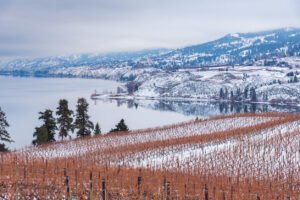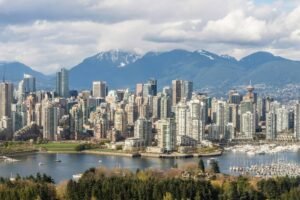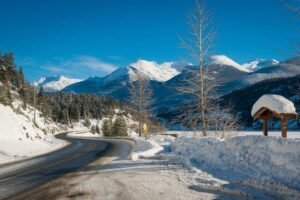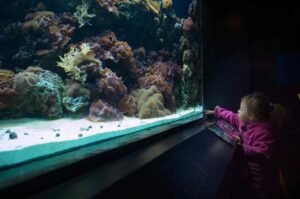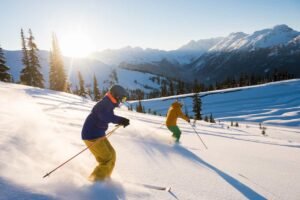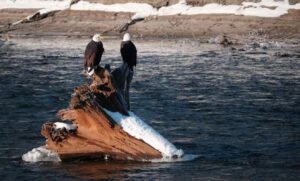Curious about Astronomy British Columbia? This guide highlights the best stargazing locations, optimal seasons, and tips for a memorable experience under the star-filled skies of BC. British Columbia also hosts various astronomy events that attract enthusiasts from all over.
Key Takeaways
British Columbia offers prime stargazing locations like Cypress, Porteau Cove, and Muncho Lake, each providing minimal light pollution and unique views of the northern lights.
The best time for witnessing the northern lights in BC is from December to March, with peak visibility between 11 PM and 3 AM due to solar activity, geomagnetic conditions, and clearer, darker skies.
Essential stargazing gear includes a wide-angle lens for photography, a thermos of a hot drink for comfort, and access to real-time aurora forecasts to enhance your experience.
Understanding the Aurora Borealis
The Aurora Borealis, or Northern Lights, is a spectacular natural phenomenon that transforms the night sky into a canvas of vibrant colors. This mesmerizing display occurs when electrically charged particles from the sun collide with gases in the Earth’s atmosphere. These collisions emit light, creating the dream-like shapes and patterns that dance across the sky.
Geomagnetic conditions play a crucial role in influencing the visibility and intensity of the aurora borealis. When geomagnetic activity is high, the auroras are more likely to be visible and can appear more vibrant and widespread. Solar activity, such as solar flares and coronal mass ejections, significantly impacts these geomagnetic conditions, thereby affecting the occurrence and visibility of the aurora borealis.
The colors of the Northern Lights can range from shimmering greens to eerie pinks. Green is the most common color, resulting from oxygen collisions, while pink hues are produced by nitrogen interactions. Witnessing the aurora borealis is like watching a celestial ballet, with each performance unique and unforgettable. This spectacular natural phenomenon is a must-see for any stargazing enthusiast.
Prime Stargazing Locations in British Columbia
British Columbia is a stargazer’s paradise, with numerous locations to witness the awe-inspiring northern lights. These spots are renowned for their stunning views, minimal light pollution, and opportunities to observe various celestial events, ideal for observing the aurora borealis. The night sky in BC becomes magical, especially when the aurora borealis performs its enchanting dance.
From the accessible Cypress Provincial Park near Vancouver to the remote Muncho Lake Provincial Park, each location offers unique stargazing advantages. Whether you’re after elevated views, coastal tranquility, or dark skies away from city lights, BC has it all. Here are some top spots to consider.
Cypress Provincial Park
Cypress Provincial Park, located just a short drive from Vancouver, is a fantastic spot for stargazing. The park’s elevated views and reduced light pollution make it an excellent spot to observe celestial events.
On a clear night, you can see:
-
the Vancouver metropolitan area
-
Mount Baker
-
the Gulf Islands
-
Vancouver Island
from the park.
The elevation of Cypress Mountain provides a prime vantage point for aurora viewing. The higher altitude reduces the interference of urban lights, offering a clearer view of the night sky. Cypress Provincial Park is a must-visit for any stargazing enthusiast, whether a Vancouver resident or a visitor.
Porteau Cove Provincial Park
Porteau Cove Provincial Park is another gem for stargazers along the Sunshine Coast. Located along the scenic Sea-to-Sky Highway, this park offers clear coastal views and minimal light interference, making it perfect for observing the night sky. The beach area of the park is free from light pollution, providing unobstructed views of celestial phenomena.
Porteau Cove’s natural beauty and optimal stargazing conditions make it a standout location for northern lights sightings. Whether you’re camping overnight or just visiting for an evening, the stunning views and tranquil atmosphere will make your stargazing experience unforgettable.
Muncho Lake Provincial Park
For those willing to venture further north, Muncho Lake Provincial Park offers some of the darkest skies in BC. This remote location is perfect for stargazing, with minimal artificial light to interfere with your view of the heavens. The park is known for its spectacular folded mountains and the cold, mineral-rich green waters of Muncho Lake, providing a stunning backdrop for celestial observations.
Muncho Lake’s remoteness enhances the visibility of celestial phenomena, making it one of the best places to see the northern lights. For a truly immersive stargazing experience away from the hustle and bustle, Muncho Lake Provincial Park is ideal.
Other Notable Locations
In addition to the well-known spots, British Columbia boasts several other notable locations for viewing the Northern Lights. Each of these places offers dark skies and minimal light pollution, making them ideal for aurora hunting.
-
Tofino: Nestled on the west coast of Vancouver Island, Tofino is renowned for its pristine beaches and dark skies. The minimal light pollution here makes it a prime location for Northern Lights sightings, offering a serene and picturesque setting for stargazing.
-
Ucluelet: Just a short drive from Tofino, Ucluelet is another gem on Vancouver Island. Its remote location and lack of urban lights provide excellent conditions for observing the aurora borealis. The rugged coastline adds a dramatic backdrop to your stargazing experience.
-
Revelstoke: Located in the interior of British Columbia, Revelstoke is a haven for outdoor enthusiasts. Its dark skies and minimal light pollution make it a fantastic spot for Northern Lights sightings. The surrounding mountains and forests create a stunning frame for the celestial display.
-
Golden: Situated in the heart of the Canadian Rockies, Golden offers breathtaking views and dark skies perfect for stargazing. The minimal light pollution in this area enhances the visibility of the Northern Lights, making it a popular destination for aurora hunters.
Best Times for Stargazing in BC
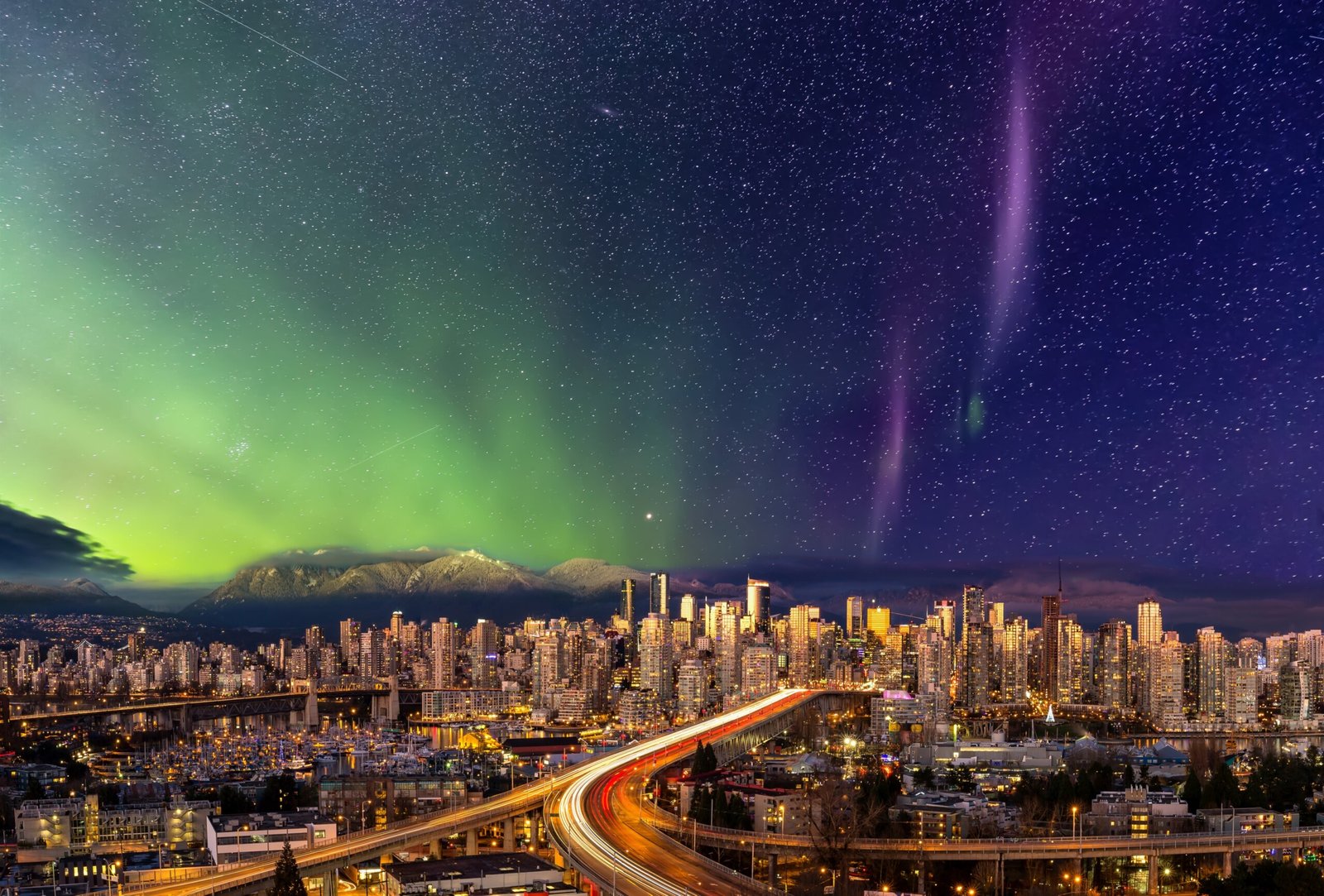
Timing is crucial for stargazing, and British Columbia provides some of the best conditions to witness the northern lights. The prime hours for observing this spectacular natural phenomenon are typically between 11:00 PM and 3:00 AM, with visibility influenced by solar activity and geomagnetic conditions.
Maximize your chances of seeing the northern lights by escaping urban environments and seeking areas far from artificial lighting. In 2024, increased solar activity will make Greater Vancouver a hotspot for northern lights sightings and northern lights vancouver, offering an excellent opportunity for stargazers.
Winter Months
December to March are the best months to witness the northern lights in British Columbia. Longer nights and clearer skies during this period provide ideal conditions for stargazing. Winter’s darker skies enhance the visibility of the aurora borealis, making it easier to see the vibrant colors and movements of the lights.
Seeking remote areas during these months increases your chances of witnessing the northern lights in their full splendor. Urban light sources can obscure the richer colors of the aurora, so it’s best to seek out locations with minimal light pollution. The winter months offer a magical experience for astronomers and stargazers alike.
Other Seasons
While winter is the prime season for aurora viewing, stargazing opportunities exist year-round in British Columbia. Fall and winter are particularly favorable due to longer nights, but spring and summer also offer unique stargazing experiences.
Visibility of celestial events varies by season and environmental conditions. With proper planning and location, you can still enjoy the night sky and catch glimpses of the northern lights, extending your view to the northern horizon.
BC’s diverse landscape and changing seasons ensure there’s always something spectacular to see in the sky.
Essential Gear for Astronomy Enthusiasts
The right gear can significantly enhance your stargazing experience. Essential equipment, from capturing stunning photos to staying warm on chilly nights, ensures you enjoy the wonders of the night sky to the fullest. A sturdy tripod, quality telescopes, and suitable cameras are just the essentials.
Here is some specific gear to enhance your stargazing adventures in British Columbia. Use satellite imagery to get real-time aurora forecasts and plan your night accordingly.
Wide Angle Lens
A wide-angle lens is essential for stargazing photographers. It captures expansive views of the night sky, enhancing the dramatic effect of celestial events. With a wide-angle lens, you can include more celestial features in your photos, creating stunning, unobstructed views.
This lens allows you to capture the beauty of the northern lights and other astronomical phenomena. Its broader perspective makes your stargazing photography more dynamic and visually appealing.
Hot Drink
Comfort is key when spending long hours under the night sky. A thermos of hot chocolate or tea can significantly improve your stargazing experience. A hot drink keeps you cozy and focused during chilly nights, making your time under the stars more enjoyable.
Staying warm is crucial for comfort and concentration. Don’t forget to pack a hot drink for extended stargazing sessions.
Real Time Aurora Forecasts
Real-time aurora forecasts are invaluable for stargazing enthusiasts engaged in aurora hunting. They use satellite imagery to provide accurate predictions of aurora activity, allowing you to plan your outings more effectively. Checking the aurora forecast increases your chances of witnessing the northern lights.
Access these forecasts through the Space Weather Prediction Center on NOAA’s website. With real-time data, you can prepare for higher aurora activity and ensure you don’t miss this spectacular natural phenomenon.
Tips for Avoiding Light Pollution
Light pollution can significantly hinder your stargazing, obscuring stars and celestial events. To see the northern lights in all their glory, find locations with minimal light pollution. Coastal spots like Lighthouse Park and the Cariboo-Chilcotin areas are excellent choices far from artificial lighting.
Here are some tips for finding the best dark skies for stargazing in British Columbia.
Away from City Lights
Escape city lights and urban environments to truly appreciate the northern lights. Urban light pollution restricts the visibility of the aurora, often limiting the colors to greens and reds. Seek locations far from urban lights to enjoy darker skies and more vibrant celestial displays.
Choosing a remote location enhances your stargazing experience and offers a sense of tranquility and connection with nature. Pack your gear and head away from city lights for the best northern lights sightings.
Dark Skies Near Vancouver
If you’re near Vancouver and looking for convenient stargazing spots, Garibaldi Provincial Park offers excellent opportunities. These areas have minimal light pollution and clear skies, perfect for observing the night sky. Dark skies near Vancouver allow for unobstructed views of astronomical phenomena.
Whether you’re a local or a visitor, these dark sky locations near Vancouver are ideal for a memorable stargazing adventure.
Planning Your Trip
Planning a trip to see the Northern Lights in British Columbia can be an exciting adventure. Here are some tips to help you make the most of your journey:
-
Research: Start by researching the best locations for viewing the Northern Lights in BC. Consider factors like accessibility, amenities, and light pollution levels to choose the perfect spot.
-
Timing: Plan your trip during the winter months, from December to March, when the nights are longest and darkest. This period offers the best chances to see the Northern Lights in their full glory.
-
Accommodations: Book your accommodations well in advance, especially during peak season. Look for places that offer easy access to your chosen stargazing spot and minimal light interference.
-
Camera: Bring a camera with a wide-angle lens and a sturdy tripod to capture the Northern Lights. These tools will help you take stunning photos of the celestial display.
-
Patience: Be prepared to spend several hours waiting for the Northern Lights to appear. Dress warmly, bring snacks, and enjoy the tranquility of the night sky as you wait for the magic to unfold.
Photography Tips
Capturing the Northern Lights on camera can be a challenging but rewarding experience. Here are some tips to help you get the best shots:
-
Camera: Use a camera with a wide-angle lens and a tripod to capture the expansive views of the Northern Lights. A wide-angle lens allows you to include more of the sky in your photos, creating dramatic and dynamic images.
-
ISO: Set your camera to a low ISO (100-400) to minimize noise and capture the Northern Lights in all their glory. A lower ISO ensures that your photos are clear and crisp, with minimal graininess.
-
Shutter Speed: Use a slow shutter speed (10-30 seconds) to capture the movement of the Northern Lights. A longer exposure time allows more light to enter the camera, resulting in brighter and more detailed images.
-
Aperture: Set your aperture to a wide setting (f/2.8-f/4) to let in as much light as possible. A wider aperture helps to capture the faint details of the Northern Lights, making your photos more vibrant and colorful.
-
Focus: Use manual focus to ensure that your camera is focused on infinity. This setting helps to keep the stars and Northern Lights sharp and in focus.
-
Composition: Consider the composition of your shot, including the foreground and background. Adding elements like trees, mountains, or water can create a more interesting and balanced image.
By following these tips, you’ll be well-equipped to capture the beauty of the Northern Lights and create stunning photographs that you’ll cherish for years to come.
Resources for Stargazers
For those eager to witness the breathtaking spectacle of the Northern Lights in Vancouver, we’ve compiled a list of essential resources to enhance your stargazing experience. Whether you’re a seasoned astronomer or a curious beginner, these tools and organizations will help you make the most of your night sky adventures.
Astronomy Events and Activities in BC
British Columbia hosts numerous astronomy events and activities that bring enthusiasts together. From star parties to cross-country skiing under the stars, these events offer unique ways to enjoy the night sky and learn about the cosmos.
Here are some exciting events and activities to consider.
Star Parties
Star parties are gatherings where locals and visitors come together to observe celestial phenomena. Often held at dark sky preserves like Mchttps://britishcolumbia.com/wp-content/uploads/2020/07/discovery-islands-lodge-1-accommodation-quadra-island-british-columbia-1.jpg Park, these events provide opportunities to share knowledge and experiences while enjoying the night sky. Mchttps://britishcolumbia.com/wp-content/uploads/2020/07/discovery-islands-lodge-1-accommodation-quadra-island-british-columbia-1.jpg Park, located under an hour’s drive from Vancouver, is known for its dark skies and hosts regular astronomy events.
Attending a star party is a fantastic way to connect with fellow stargazers and immerse yourself in the enchanting dance of the northern lights and other celestial events.
Cross Country Skiing Under the Stars
In BC’s northern region, cross-country skiing combined with stargazing offers a unique and unforgettable experience. These events allow participants to enjoy the beauty of the night sky while staying active. Imagine gliding through snow-covered trails with the northern lights illuminating the sky above.
This combination of activities creates a magical experience, ideal for those who love both adventure and the wonders of the cosmos.
Conclusion
In conclusion, witnessing the Northern Lights in Vancouver is a rare and spectacular event that can be affected by solar activity and magnetic storms. While the city’s light pollution can make it challenging to see the aurora borealis, there are several locations in and around Vancouver that offer minimal light pollution and a higher chance of witnessing this natural phenomenon.
Cypress Provincial Park, Porteau Cove Provincial Park, and other locations on the Sunshine Coast are popular spots for northern lights sightings. These areas offer dark skies and a northern horizon, making them ideal for aurora hunting.
If you’re planning to see the northern lights in Vancouver, it’s essential to check the forecast and be prepared to head out to a location with minimal light pollution. Bring warm clothing, a camera, and a sense of adventure, and you might just be rewarded with a spectacular display of the aurora borealis.
Remember, the northern lights are a natural phenomenon, and there’s no guarantee that you’ll see them. However, with a little planning and patience, you can increase your chances of witnessing this breathtaking display.
So, grab your cross-country skis, head out to the mountains, and enjoy the beauty of the northern lights in Vancouver. Whether you’re a seasoned aurora hunter or just starting to explore the world of northern lights sightings, Vancouver has plenty to offer.
In the northern region of British Columbia, the sky highway offers a unique opportunity to see the northern lights in all their glory. With its minimal light pollution and stunning natural beauty, this region is a must-visit for anyone interested in witnessing the aurora borealis.
So, come and experience the magic of the northern lights in Vancouver. With its urban lights, natural beauty, and spectacular displays of the aurora borealis, this city has something for everyone. Whether you’re a nature lover, a photographer, or just someone who appreciates the beauty of the night sky, Vancouver is the perfect destination for you.
In conclusion, the northern lights are a spectacular natural phenomenon that can be seen in Vancouver, despite the city’s light pollution. With a little planning and patience, you can increase your chances of witnessing this breathtaking display. So, grab your camera, head out to a location with minimal light pollution, and enjoy the beauty of the aurora borealis in Vancouver.
Summary
British Columbia offers some of the best locations and conditions for stargazing and witnessing celestial events and the northern lights. From Cypress Provincial Park to Muncho Lake, each location provides unique advantages for observing the night sky. Winter months offer optimal conditions, but stargazing opportunities exist year-round. Essential gear and avoiding light pollution can significantly enhance your experience.
Participating in astronomy events and activities, such as star parties and cross country skiing under the stars, adds another layer of enjoyment to your stargazing adventures. So, gather your gear, plan your trip, and immerse yourself in the magical world of stargazing in British Columbia.
Frequently Asked Questions
What are the best locations in BC to see the northern lights?
Cypress Provincial Park, Porteau Cove Provincial Park, and Muncho Lake Provincial Park are your best bets for catching the northern lights in BC. These spots offer stunning views and great chances to witness this magical phenomenon.
When is the best time to see the northern lights in BC?
The best time to see the northern lights in BC is during the winter months, from December to March, when the nights are longer and skies are clearer. So bundle up and head out for an unforgettable experience!
What gear is essential for stargazing?
For a great stargazing experience, a comfortable thermos of a hot drink, along with a wide-angle lens if you’re into photography, is essential. Also, checking real-time aurora forecasts can really enhance your outings.
How can I avoid light pollution while stargazing?
To avoid light pollution while stargazing, head to spots away from city lights, like Garibaldi Provincial Park or the Cariboo-Chilcotin areas. You’ll get to enjoy much clearer and more stunning views of the night sky!
Are there any astronomy-related events in BC?
Absolutely, BC hosts great astronomy events like star parties and skiing under the stars, perfect for enjoying the night sky and meeting fellow stargazers.

